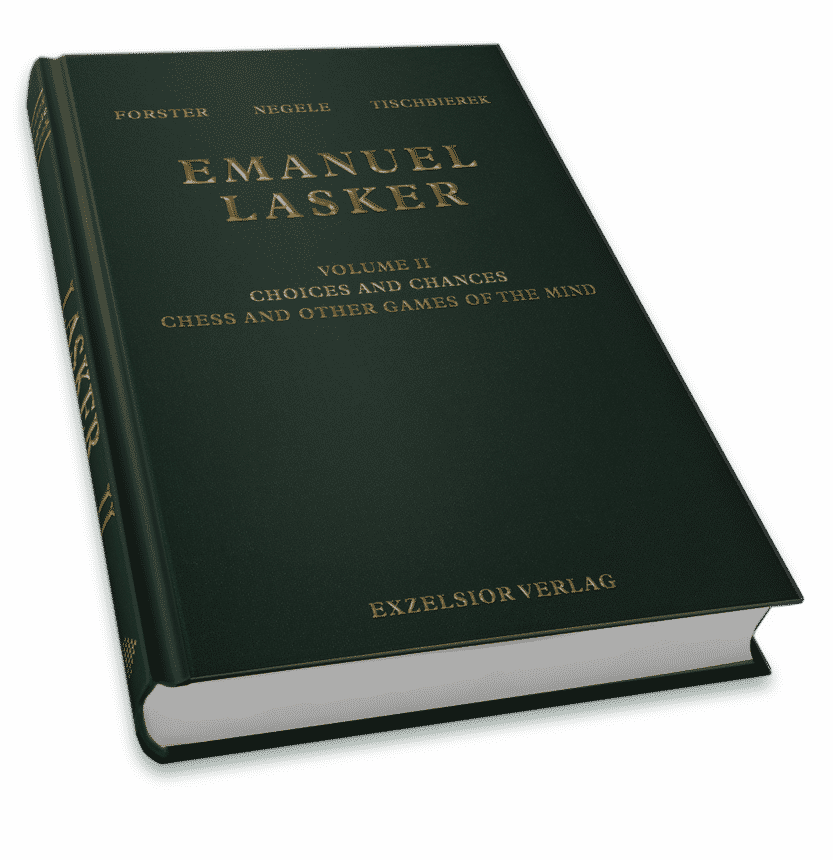Emanuel Lasker, Volume 2
Struggle and Victories - World Chess Champion for 27 Years
$75.00
Out of stock
About the Book
By special arrangement with German publisher Exzelsior Verlag, McFarland is reselling the second volume in a new, English–language series about German chess player and world champion Emanuel Lasker. This is a multicontributor biographical work, with chapters by a number of acclaimed chess historians. Following up on the first volume, the second volume covers the undisputed world champion in the Belle Epoque, and the crossroads he faced between academia and chess. Other chapters highlight Lasker’s interest in bridge, go, and game theory.
*This item is not eligible for promotional or wholesale discounts.
About the Author(s)
Bibliographic Details
Edited by Richard Forster, Michael Negele, and Raj Tischbierek
Foreword by Vladimir Kramnik
Format: library binding (7″ x 10″)
Pages: 464
Bibliographic Info: 188 photos, general index
Copyright Date: 2020
pISBN: 9783935800105
eISBN: n/a
Publisher: Exzelsior Verlag GmbH
Table of Contents
Foreword
(Vladimir Kramnik)
Preface
(Richard Forster, Michael Negele, Raj Tischbierek)
1 A Biographical Compass, Part 2
(Michael Negele, Richard Forster)
2 Lasker in Holland
(Richard Forster, Michael Negele, Bob van de Velde)
3 Lasca–a Strategic Mind Game
(Wolfgang Angerstein)
4 Lasker and Go
(Theo van Ees, Hans-Christian Wohlfarth)
5 Lasker as a Bridge Expert
(Bob van de Velde)
6 Emanuel Lasker and Game Theory
(Jorg Bewersdorff)
7 The New York 1924 Tournament
(John Donaldson)
8 The New York Controversy
(Richard Forster)
9 Emanuel Lasker–the Man to Beat
(Mihail Marin)
General Index
Book Reviews & Awards
REVIEWS OF VOLUME ONE:
- Finalist, Book of the Year–English Chess Federation
- “The editors combined with ten (!) high calibre contributors to produce an outstanding work on Lasker’s early years up to about 1909. All aspects of Lasker’s complex character are explored. Not all the many chapters can be mentioned here; two outstanding are the examination of the World Championship match with Tarrasch in 1908 and Marin’s deep analysis of Lasker’s style. Expensive, but worth every penny.”–English Chess Federation
- “For a player with such a prodigious career as Lasker’s, the widely spread syntagm that he was mainly paying attention to the psychological aspects of the over the board fight is not only unfair, but also presents the risk of lowering his purely technical merits in the public opinion’s eyes. There are a few more objective and deeper elements that make his best games instructive for the modern player. Lasker was an universal player, able to find his way in a wide range of positions, from the most quiet (or boring) ones to the most chaotic and irrational ones. As a general thread, he possessed the ability of generating ideas out of the blue, as a player who would not just follow the requirements of the position, but make the game flow along his own plans. From this point of view I would compare him with David Bronstein and Magnus Carlsen. In an era dominated by computers, the modern player can learn from Lasker’s games how to think independently, a most dangerous weapon against the opponents dependent on the dry “+1.00” way of reasoning. On more concrete terms and even though by far not all his games are linear and flawless, players of all ages and levels will find a handful of positions and sequences perfectly suited for training or learning and, quite surely a lot of fun.”–Mihail Marin
- “This volume, the first of three, presents Lasker in a depth and breadth never before seen. His life, in all its astonishing facets, is reflected in the many contributions by eminent figures in their fields. I can’t speak for my own contribution, but I can for the rest of the book: beautifully bound, handsomely illustrated, finely written, impeccably edited, Emanuel Lasker is that rarest of chess biographies: a worthy historical tribute and a fascinating read.” — John Hilbert




